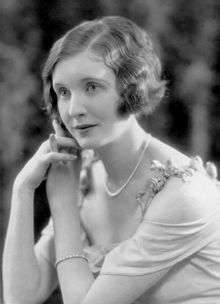June Tripp
| June Tripp | |
|---|---|
 June Tripp in 1923 | |
| Born |
June Howard-Tripp 11 June 1901 Blackpool, England, UK |
| Died |
14 January 1985 (aged 83) New York City, New York, USA |
| Occupation | Actress |
| Years active | 1920–1943 |
| Spouse(s) |
John Alan Burns, 4th Baron Inverclyde (1929–1933) Edward Hillman (1937-????) |
June Tripp (June 11, 1901 – January 14, 1985), sometimes known just by her screen name, June, was a British actress.
Born June Howard-Tripp in London, she worked mainly on stage (in revue). She made a handful of films, mostly in the silent era. Her most notable screen role was in the silent Alfred Hitchcock thriller The Lodger: A Story of the London Fog (1927) opposite Ivor Novello.
In 1929, she married John Alan Burns, 4th Baron Inverclyde and left theatre and film to become a socialite, living at the Inverclyde seat Castle Wemyss. They divorced in 1933 and she returned to the stage. In 1937 she married the American businessman Edward Hillman Jr. They divorced in 1939 but later remarried. In later life, she appeared in a cameo role in Forever and a Day (1943), as well as several other films, and provided the narration on the Jean Renoir film The River (1951); in the 1950s she retired from acting for good. In 1951 she became a US citizen[1] and published her biography in 1960.
Filmography
- The Yellow Claw (1920)
- Riding for a King (1926)
- The Lodger: A Story of the London Fog (1926)
- Forever and a Day (1943)
- Mrs Parkington (1944)
- A Song for Miss Julie (1945)
- The River (1951) (narrator)
- Les Misérables (1952)
Autobiography
- The Glass Ladder (London: Heinemann, 1960)
References
External links
- June Tripp on IMDb